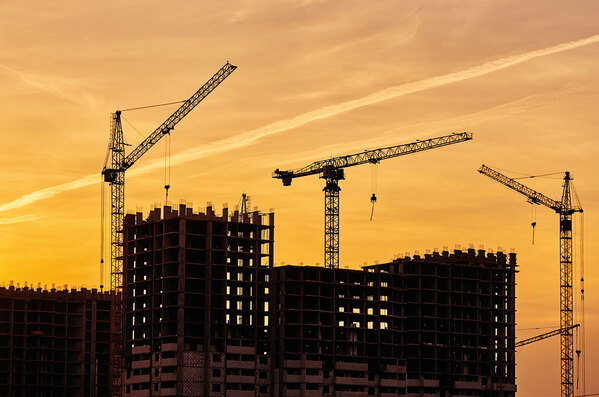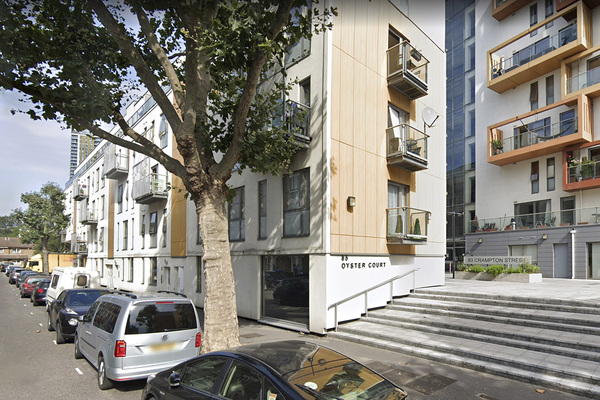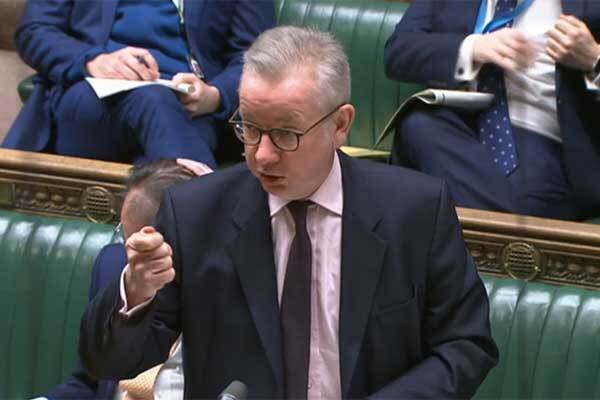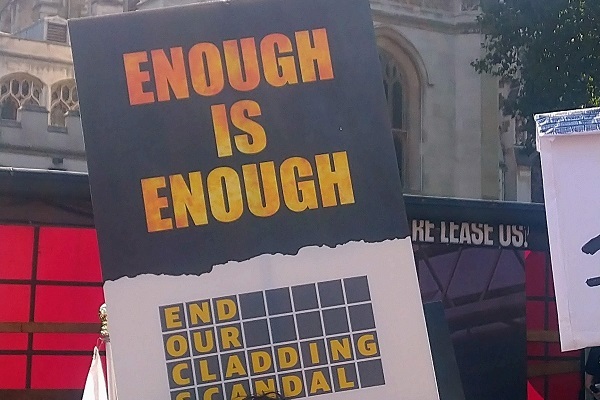You are viewing 1 of your 1 free articles
Gove gives developers March ultimatum to agree on £4bn building safety plan
Michael Gove has warned developers if they don’t agree to fund his new £4bn building safety plan by March, he may force them to cough up the huge sums by law.
In a letter written today, the housing secretary warns developers that if they can’t agree to the terms of his new plan aimed at protecting leaseholders from crippling cladding costs, he could use different restrictions such as public contract bans, planning restrictions or pursuing them through the courts.
If these do not work, Mr Gove said the government would be forced to “impose a solution in law”.
The letter comes ahead of Mr Gove standing in parliament later today to outline his plans to end the building safety crisis and protect leaseholders from remediation costs.
As part of the speech, Mr Gove will say that he does not expect any leaseholder or shared owner in a block over 11 metres to pay anything towards the cost of cladding removal.
To support this, he has now officially scrapped the controversial cladding loan scheme for leaseholders in buildings below 18 metres and will instead put in place a fund for these buildings which he aims to get developers to pay for.
In addition to contributing towards the fund, Mr Gove also wants developers to fund and undertake all necessary remediation on buildings they developed over 11 metres, and provide comprehensive information on all buildings over 11 metres which have historic fire safety defects which they have built in the past 30 years.
Over the coming weeks, the government will host a series of roundtables with ministers, developers and leaseholders that will look to agree a settlement. This will open with the 20 biggest house builders in the sector being invited into government to start discussions.
Mr Gove says that these should be an “open and transparent” discussion, with the settlement restoring confidence in the industry and “ensuring the industry that caused the problem pays to fix it”.
Negotiations will then continue with smaller developers that will be pulled into scope of the deal.
The government has said that it will only decide on which companies are in scope of the tax following the discussions with industry, but expects it to cover all firms with annual profits from housebuilding that surpass £10m.
This would be a significant change from the current developer levy in place, which sees developers that accrue profits of over £25m being levied at 4% of every pound over that figure.
It was expected at the time that it would hit the country’s 30 biggest builders. However, the new £10m threshold would likely bring in dozens more.
The Home Builders Federation (HBF), the body that represents the country’s largest house builders, said over the weekend that while it accepted leaseholders shouldn’t pay, builders should not contribute alone.
Stewart Baseley, executive chair of the HBF, said: “While house builders are committed to playing their part, there are many other organisations involved in the construction of affected buildings, including housing associations and local authorities.”
“Specifications for buildings would have been in accordance with building regulations set by government at the time of construction.
“As well as developers and government, other parties should be involved in remediation costs, not least material manufacturers who designed, tested and sold materials that developers purchased in good faith that were later proved to not be fit for purpose.”
It would appear that Mr Gove will also use other penalties against developers if they are unwilling to contribute to the fund. This includes public contract bans and blocking them from other government-funded programmes like the Help to Buy.
This comes after Mr Gove banned Rydon Homes, a sister company of Grenfell lead contractor Rydon Maintenance, from accessing the Help to Buy programme before Christmas.
The speech today is expected to include a number of new proposals aimed at helping leaseholders and trying to minimise the impact of the building safety crisis. These include scrapping the controversial Consolidated Advice Note, accelerating funds out of the Building Safety Fund to the most high-risk buildings, and providing additional help for leaseholders being hit with extortionate waking watch fees.
In the letter sent today, Mr Gove has said: “It is neither fair nor decent that innocent leaseholders, many of whom have worked hard and made sacrifices to get a foot on the housing ladder, should be landed with bills they cannot afford to fix problems they did not cause.
“Government has accepted its share of responsibility and made significant financial provision through its ACM [aluminium composite material] remediation programme and the Building Safety Fund. Some developers have already done the right thing and funded remedial works and I commend them for those actions.
“But too many others have failed to live up to their responsibilities.”
Gove’s letter to developers in full
Dear Residential Property Developer Industry
GOVERNMENT APPROACH TO BUILDING SAFETY
Following my statement in the House of Commons on building safety, I am writing to ask you to work with me to deliver a lasting industry solution to fix this crisis.
In relation to 11-18m buildings, the vast majority are safe. Others that do have combustible cladding may also be safe or can be made safe through effective use of existing or new fire safety measures such as sprinklers and alarms. There are, however, a small number of residential buildings with unsafe cladding which must be addressed.
It is neither fair nor decent that innocent leaseholders, many of whom have worked hard and made sacrifices to get a foot on the housing ladder, should be landed with bills they cannot afford to fix problems they did not cause.
Government has accepted its share of responsibility and made significant financial provision through its ACM remediation programme and the Building Safety Fund. Some developers have started doing the right thing and funded remedial works and I commend them for those actions. But too many others have failed to live up to their responsibilities.
I am now offering a window of opportunity, between now and March, for the industry as a whole to work with my department through open and transparent negotiations to agree a settlement that will restore confidence and ensure the industry that caused the problem pays to fix it.
A new deal with industry must be built around clear commitments from developers, that you should:
- Agree to make financial contributions this year and in subsequent years to a dedicated fund to cover the full outstanding cost to remediate unsafe cladding on 11-18m buildings, estimated currently to be £4bn;
- Fund and undertake all necessary remediation of buildings over 11m that you have played a role in developing (ie both 11-18m and 18m+). Any work undertaken by developers themselves on 11-18m buildings will reduce the total cost of cladding remediation that has be paid for through the proposed 11-18m fund; and
- Provide comprehensive information on all buildings over 11m which have historic fire-safety defects and which you have played a part in constructing in the last 30 years.
I hope you will also commit to work with us to take forward all necessary remediation work at pace – prioritising those buildings with the greatest risks first and in all cases finding the quickest and most proportionate solution to make buildings safe.
I will open discussions through a roundtable that brings together 20 of the largest house builders and developer trade bodies, followed by ongoing negotiations with all those in scope.
In addition, given leaseholders and those affected by the Grenfell Tower tragedy are central to this process, we will be working closely with them throughout and will bring them to the table to discuss solutions at appropriate junctures. I do not intend for these discussions to take place behind closed doors.
I expect a public commitment to this framework by early March. At that point we must have a clear, fully-funded plan of action that we can make available to the public and to affected leaseholders.
I am sure you are as committed as I am to fixing a broken system. I want to work with you to deliver the programme I have set out. But I must be clear, I am prepared to take all steps necessary to make this happen, including restricting access to government funding and future procurements, the use of planning powers, the pursuit of companies through the courts and – if the industry fails to take responsibility in the way that I have set out – the imposition of a solution in law if needs be.
Our home should be a source of security and pride. For too many of the people living in properties your industry has built in recent years, their home has become a source of misery. This must change.
I look forward to working with you over the coming weeks to deliver a just deal for industry, leaseholders and the taxpayer.
With every good wish,
Rt Hon Michael Gove MP
Secretary of State for Levelling Up, Housing and Communities and Minister for Intergovernmental Relations
Sign up for our fire safety newsletter
Already have an account? Click here to manage your newsletters












